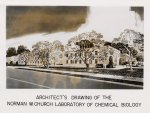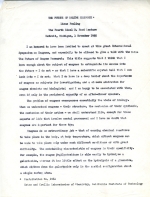|
In the first couple of years after Pauling became interested in molecular medicine
he hoped to make people healthier with artificial enzymes. He thought diseases could
be combated by making enzymes that inhibit or induce chemical reactions that occur
inside the human body. Pauling aimed to learn more about chemical structures of proteins,
enzymes, and other bodily compounds in an effort to gain an understanding of the basics
of diseases, as opposed to attacking each affliction individually and haphazardly.
To aid him, Pauling teamed up with three men for a collaborative research project
on mental illnesses, which was conducted largely at Caltech. Two of the men, Dr. George
Tarjan of Pacific State Hospital and Dr. Stanley Wright of UCLA Medical School, worked
with mentally disabled people. The other man was Richard Morgan, a member of the California
Office of the Department of Mental Hygiene. The four men discussed possible areas
of research in 1955 and decided that Pauling should submit a grant proposal to the
Ford Foundation, a philanthropic foundation that aimed "to receive and administer
funds for scientific, educational, and charitable purposes, all for the public welfare."
The four men received generous grants; the Ford Foundation gave Caltech $450,000 over
five years and UCLA $500,000.
In 1955 Caltech finished building the Norman W. Church Laboratory of Chemical Biology,
the location for most of the new research. In addition to money from the Ford Foundation,
Caltech also received from the Rockefeller Foundation $700,000 to help build the Church
Laboratory, and an additional $800,000 for the research conducted in it.
|
|
Click images to enlarge

Architectural rendering of the Norwan W. Church Laboratory of Chemical Biology, California
Institute of Technology. approx. 1955.

"The Future of Enzyme Research." November 1, 1955.
"As to the Chemical-Biology building, we hope very much that Mr. Norman Church will
make provisions so that we can start work on it in the near future. As Kirkwood has
no doubt told you, Mr. Church has pledged himself to provide $1,500,000 for a Chemical-Biology
building....It was the greatest good fortune, indeed, that he offered this gift just
at the time when the Rockefeller gift came through."
|

